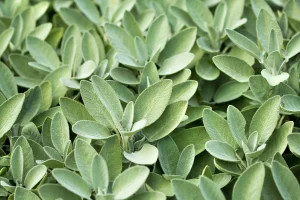Is Sage safe for cats?
Many cat owners are curious about whether Is Sage safe for cats. According to the American Society for the Prevention of Cruelty to Animals (ASPCA), sage is generally considered to be non-toxic to cats and is considered safe. However, it is important to keep in mind that some cats may be sensitive to certain herbs or other substances and that in some cases, these substances may cause adverse reactions or interfere with a cat’s regular diet.

What is Sage and its Usages
Sage also known as (Salvia officinalis)is a type of herb that is commonly used in cooking to add flavor to dishes. It is a member of the mint family and has a slightly bitter, earthy flavor. It is often used to season meat, vegetables, and soups, and is also a popular ingredient in stuffing and other holiday dishes. Sage is also used for its medicinal properties and is believed to have anti-inflammatory and antioxidant effects. It is typically used in dried form but can also be used fresh. Some people also use sage essential oil, which is derived from the plant and can be used for a variety of purposes, including aromatherapy and natural skin care.
Sage can be used in various forms, such as tea or tincture, and has various applications. For example, it can be used as a compress or poultice on skin infections, or as a tea infusion for mouth infections such as ulcers, gingivitis, or sore throats. Sage is easy to grow and can be harvested just before the flowers appear. However, it should be used with caution in pets that are epileptic.
How much Sage can be given to a cat
Is Sage safe for cats, the safety of giving sage to a cat will depend on factors such as the cat’s age, size, and overall health, as well as the specific type and formulation of the herb. It is important to prevent your cat from having unlimited access to sage plants or leaves, especially if they have a tendency to chew on plants. To protect your cat’s health, limit their access to sage plants, leaves, dried sage, and foods containing sage.
How to keep your cat away from Sage
If you think that Sage is not safe for your cat, there are a few things you can try to keep your cat away from Sage or any other plant:
- Provide your cat with plenty of toys and activities to keep them entertained and prevent them from getting bored and looking for things to play with in your plants.
- You can try using citrus-scented sprays or essential oils to repel your cat. Cats often dislike the smell of citrus and will avoid areas that have a strong citrus scent.
- You can use this to your advantage by using citrus-scented sprays or essential oils to keep your cat away from your plants. Some examples of citrus scents that you can use include lemon, lime, orange, and grapefruit. To use these scents to keep your cat away from your plants, simply spray the scents around your plants or dab a few drops of essential oil onto cotton balls and place them near your plants. This should help to repel your cat and keep them away from your plants. Keep in mind, however, that some cats may not be deterred by citrus scents and may continue to bother your plants. In this case, you may need to try other methods to keep your cat away from your plants.
- You can also try using double-sided tape or aluminum foil on the tops and sides of your plant pots. Cats don’t like the feeling of sticky or slippery surfaces and will avoid walking on them.
- You can also try moving your plants to an area of your home that is difficult for your cat to access. For example, placing plants on high shelves or in rooms that are off-limits to your cat can help keep them away from your plants.
- Finally, you can try training your cat to stay away from your plants. This can be done by consistently rewarding them for staying away from the plants and using a stern “no” or a spray of water to discourage them from going near the plants. Over time, your cat should learn to avoid the plants on their own.
Article: Are Money Tree Toxic to Cats?
Conclusion
Sage is generally considered safe for cats, according to the American Society for the Prevention of Cruelty to Animals (ASPCA). However, it is important to keep your cat from having unlimited access to sage plants or leaves, especially if they have a tendency to chew on plants. To protect your cat’s health, limit its access to sage plants, leaves, dried sage, and foods containing sage. If you want to keep your cat away from sage or other plants, you can try using citrus-scented sprays or essential oils, double-sided tape, or aluminum foil on plant pots, moving the plants to an inaccessible area, or training your cat to stay away from the plants.
